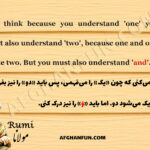The Inevitable End: Rumi’s Reflection on Death and Legacy
A possible English translation of the Rumi poem you provided, keeping in mind that translating poetry is a complex task due to nuances and cultural references that may not have direct equivalents in another language:
rumi
Ultimately, the beauty of you and me will turn to dust;
Both good and bad will pass, alas for the fate of you and me.
Today’s lot may be mine, tomorrow another’s turn to face,
For the arrow of death will strike the wings of both you and me.
Earthly wealth can’t be a barrier to death’s decree…
Even if the entire world belonged to you and me.
Fleeting Beauty: Rumi’s Meditation on the Transient Nature of Life
عاقبت خاك شود حسن جمال من و تو
مولانا جلال الدین محمد بلخی
خوب و بد میگذرد وای به حال من تو
قرعه امروز به نام من و فردا دگری
مي خورد تیر اجل بر پر و بال من تو
مال دنیا نشود سد ره مرگ کسی…
گیرم که کل جهان باشد از آن من تو
این غزل، نمونهای از اشعار عرفانی مولانا است که در آن، مفاهیمی چون فناپذیری، بیثباتی دنیا، و اهمیت توجه به آخرت مطرح شده است. شاعر با استفاده از زبان ساده و بیان عاطفی، به مخاطب خود هشدار میدهد که به دنیا و زیباییهای آن دل نبندد و به فکر آخرت باشد.
The Great Leveler: Rumi’s Quatrain on Death and Wealth
Оқибат хок шавад ҳусну ҷамоли ману ту,
Мавлоно Ҷалолуддин Муҳаммади Балхӣ
Хубу бад мегузарад вой ба ҳоли ману ту.
Қуръа имрӯз ба номи ману фардо дигарест,
Мехурад тири аҷал бар пару боли ману ту.
Моли дунё нашавад садди раҳи марги касе,
Гирам ин кулли ҷаҳон бошад аз они ману ту.
Оқибат хок шавад ҳусну ҷамоли ману ту,
Мавлоно дар ин байт ёдовар мешавад, ки зебоиву ҷамоли инсон танҳо як муддати кӯтоҳ дар зиндагӣ боқӣ мемонад ва дар охир ба хок табдил мешавад. Ин таъкид мекунад, ки набояд ба зебоии зоҳирӣ беандоза вобаста бошем.
Хубу бад мегузарад, вой ба ҳоли ману ту…
Ҳар чи ки дар зиндагӣ рӯй медиҳад, хоҳ хуб бошад, хоҳ бад, мегузарад. Аммо агар мо худро танҳо бо ин гузарандҳои фони машғул кунем, ҳолати рӯҳонӣ ва маънавии мо зиён мебинад.
Қуръа имрӯз ба номи ману фардо дигаре…
Марг як ҳақиқатест, ки на аз ман мегузарад, на аз ту. Имрӯз навбати ман, фардо навбати дигаре. Ин нишон медиҳад, ки зиндагӣ ва марг барои ҳама баробар аст.
Мехӯрад тири аҷал бар парру боли ману ту…
Тири марг ба ҳама мерасад, новобаста аз он ки мо кӣ ҳастем. Ҳеҷ кас аз он гурехта наметавонад.
Моли дунё нашавад садди раҳмарги касе…
Ҳатто агар тамоми сарвати ҷаҳонро дошта бошем, он наметавонад моро аз марг нигоҳ дорад. Ин байт таъкид мекунад, ки дороиҳои моддӣ дар пеши марг бемаънӣ мешаванд.
Гирам, ки кулли ҷаҳон бошад аз они ману ту…
Ҳатто агар тамоми ҷаҳон ба мо тааллуқ дошта бошад, он бо арзиши абадӣ аҳамият надорад. Зеро тамоми чизҳо фониянд ва танҳо рӯҳонӣ ва маънавӣ ба ҷовидонагӣ мерасад.
Together in Dust: Rumi’s Verse on the Universal Fate
Here’s a possible Arabic translation of the Rumi poem, keeping in mind these challenges:
مولانا جلال الدین محمد بلخی
Arabic Translation:
في النهاية، جمالنا سيتحول إلى تراب،
الفرح والحزن يمران، لا قيمة لهما.
سهم القدر يصيبنا جميعًا،
الحياة سريعة الزوال، ماذا علينا أن نفعل؟
الثروة لا تستطيع شراؤنا من قبضة الموت،
حتى لو كان العالم كله ملكنا.
يمكن تلخيص هذه القصيدة في أنها تتحدث عن فناء الجمال والشباب، وعن زوال الدنيا وما فيها من متاع. يشير الشاعر إلى أن الموت لا مفر منه مهما بلغ الإنسان من ثراء أو سلطة. كما يعبر عن قلق الإنسان من المستقبل والمجهول.
This Rumi poem is a reflection on the transience of life, the inevitability of death, and the futility of clinging to worldly possessions or distinctions. Let’s break down its key themes and messages:
1. Impermanence and Mortality
The poem opens with the recognition that “the beauty of you and me will turn to dust.” This speaks to the impermanence of everything — even the most beautiful or cherished aspects of human existence. The phrase “turn to dust” evokes the idea of the body’s return to the earth, a theme common in Sufi and Rumi’s mystical philosophy. It implies that all things, whether beautiful or not, ultimately dissolve into nothingness.
Rumi reiterates this point with the line, “Both good and bad will pass.” Both joy and sorrow, life’s pleasures and its trials, are fleeting. This suggests that both the highs and lows of human experience should be viewed with equanimity, as none of it lasts forever.
2. Death’s Universality and Inevitability
The lines “For the arrow of death will strike the wings of both you and me” convey death as a force that is both inevitable and impartial. The metaphor of the “arrow of death” suggests that death is not something we can avoid or delay; it is a natural, unstoppable force that will eventually touch everyone. “The wings” could symbolize freedom, aspirations, or life itself, implying that death will strike at the heart of our most vital and cherished aspects.
3. The Futility of Materialism
Rumi writes, “Earthly wealth can’t be a barrier to death’s decree,” which points to the futility of material possessions in the face of death. No amount of wealth, status, or worldly achievement can protect someone from their ultimate fate. The idea that “Even if the entire world belonged to you and me” emphasizes that material abundance cannot stave off mortality, and that death makes all such possessions irrelevant.
4. Surrender to the Divine Order
Underlying the poem’s theme of mortality is the suggestion that we must accept the limitations of our human condition. While the poem doesn’t explicitly say so, Rumi’s broader work often suggests that surrendering to the divine will — acknowledging the impermanence of life and the inevitability of death — can lead to spiritual liberation. The acceptance of death as part of the natural order is a key element in many Sufi teachings, and in Rumi’s own mystical philosophy, it often leads to greater peace, unity with the divine, and freedom from the attachments that cause suffering.
Summary
In this poem, Rumi reflects on the transient nature of life, reminding us that beauty, success, and suffering are all temporary. Death is inevitable and indiscriminate, and nothing — not wealth nor status — can alter this truth. The message encourages humility, detachment from worldly concerns, and a deeper understanding of life’s fleeting nature. In a spiritual sense, the poem may be urging us to look beyond external circumstances and material pursuits and turn toward the eternal, divine reality.
External links:
Rumi’s Masnavi-ye-Ma’navi in Persian











